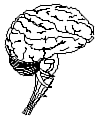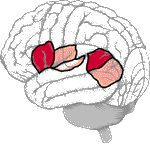


Few areas are as fertile for teachers as brain research-based writings. Only in recent years, since the development of new imaging techniques in medicine, have we had a substantial basis for learning theory. Brain research-based learning theory gives support to problem-based learning, alternative assessment, education reform and habits of mind--to mention four other IN-SITE areas. Our understanding of the brain gives positive hope for all students, substantiates broad as well as specific aims, and gives reasons to forge connections between and among prior and new learnings.
Much of what goes on in schools and, especially, in state mandated testing, not only fails to be brain-compatible, but is actually brain antagonistic. The brain functions best with adequate time, the absence of threat, immediate feedback, dynamic interaction, with global contexts as well as delineation of parts, and in a state of relaxed alertness. The following links will elaborate. The Staff Development Course,
Brain Compatible Teaching & Learning, is now available.
All courses and web pages Copyright © 2008


The TEACHER DEVELOPMENT NETWORK

We are available for consulting and other services.
